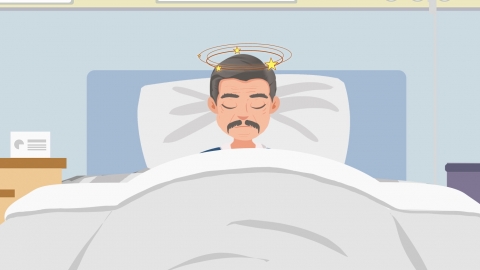What causes headaches after surgery?
Generally, postoperative headaches may be caused by reactions to anesthetic drugs, changes in posture, postoperative infections, hypotension, or increased intracranial pressure. Symptomatic management through general care and medication is usually required. If discomfort occurs, timely medical consultation is recommended for appropriate treatment under a physician's guidance. Detailed explanations are as follows:

1. Anesthetic drug reaction
Anesthetic drugs such as propofol and remifentanil may affect the dilation and constriction of cerebral blood vessels, causing headaches. Additionally, during the postoperative recovery period, the body's metabolism of anesthetic drugs may also lead to headaches. It is recommended to ensure adequate rest and maintain sufficient hydration to help alleviate symptoms.
2. Postural changes
During surgery, patients may need to maintain a specific position, and during the postoperative recovery period, limited mobility may alter daily postures. This can lead to muscle tension and headaches, possibly accompanied by symptoms such as neck stiffness and shoulder pain. It is recommended to perform appropriate stretching exercises for the neck and shoulders, improve posture, and use heat or cold compresses to relieve muscle tension.
3. Postoperative infection
If the surgical wound or surrounding tissues becomes infected, it may cause local inflammatory responses, releasing inflammatory mediators such as prostaglandins, which can stimulate pain receptors and cause vasodilation, resulting in pain, often accompanied by fever and neck stiffness. It is recommended to follow medical advice and use medications such as flomoxef sodium for injection, aztreonam for injection, or cefotaxime sodium and sulbactam sodium for injection for treatment.
4. Hypotension
During surgery, blood loss or surgical stimulation may lead to hypotension or anemia. Hypotension may reduce cerebral blood flow, causing headaches, possibly accompanied by dizziness, fatigue, palpitations, and other symptoms. It is recommended to follow medical advice and use medications such as midodrine tablets, flunarizine hydrochloride capsules, or propranolol hydrochloride tablets to alleviate symptoms.
5. Increased intracranial pressure
Increased intracranial pressure may be caused by cerebral edema, impaired cerebrospinal fluid circulation, or intracranial hematoma. Surgical procedures may sometimes cause elevated intracranial pressure, which can compress brain tissue and stretch blood vessels, stimulating pain receptors and causing headaches, possibly accompanied by nausea, vomiting, and papilledema. It is recommended to follow medical advice and use medications such as furosemide tablets, spironolactone tablets, or nifedipine tablets for treatment.
It is also recommended to keep the ward quiet, draw the curtains, and create a comfortable environment. Listening to calming music may help relax and alleviate symptoms.






